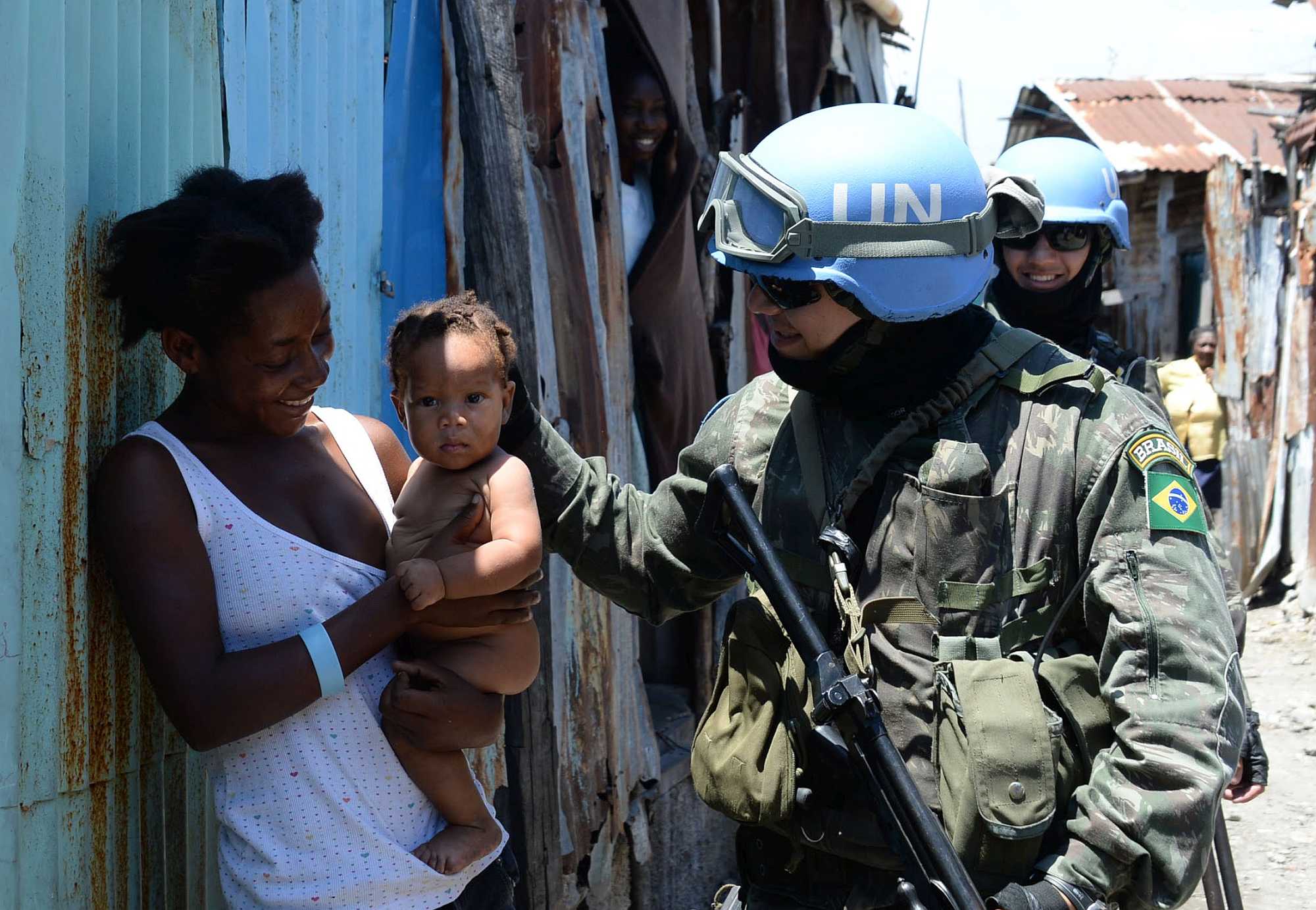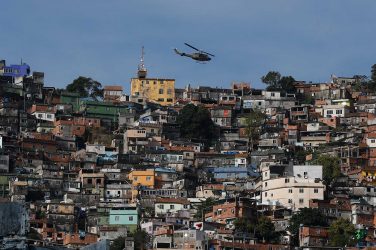After 13 years of operations and numerous announcements about the closure date, the Brazilian Armed Forces will depart the peacekeeping mission in Haiti on October 15th.
The Security Council voted unanimously on April 13th to end the United Nations Stabilization Mission in Haiti (MINUSTAH, per its French acronym), opting to substitute it with a police force called the United Nations Mission for Justice Support in Haiti, which will provide assistance in consolidating the Haitian police over the next two years.
Between May 16th and June 1st, the last Brazilian troops to operate in Haiti were deployed. Of the 970 service members sent to Haiti, 850 are from the 26th Peacekeeping Brazilian Battalion, made up of members of the Navy, Army, and Air Force, and 120 from the 26th Engineering Company, comprising solely Army personnel.
“The feeling among our Marine Corps is of a mission accomplished. Those who know, or knew Haiti 10 years ago and see the country today can most certainly perceive how the environment has changed,” said Lieutenant General Cesar Lopes Loureiro, commander of the Brazilian Marine Corps’ Fleet Marines.
He talked during the May 12th activation ceremony for the 175 marines chosen for this last mission in Haiti, at the Amphibious Division Command on Ilha do Governador in Rio de Janeiro. “In addition to other assessments, from a social point of view, political, etc., a sense of security was established, which was the mission for our MINUSTAH military components,” Lt. Gen. Loureiro stated.
When established in 2004, MINUSTAH was expected to operate for an initial period of six months. The mission included service members from 15 countries but thus far Brazil sent the largest contingent and led it since the beginning.
According to the Brazilian Ministry of Justice, by the end of the mission, more than 37,000 members of the military — 30,359 Army personnel, 6,299 from the Navy, and 350 from the Air Force — will have supported MINUSTAH. Brazil has rotated its military contingent every six months, replacing it with 1,200 personnel, on average.
Great People
When Brazil assumed military command of MINUSTAH in 2004, after President Jean-Bertrand Aristide was deposed, Haiti erupted into violence and was overtaken by armed gangs, primarily in the capital of Port-au-Prince.
Over this 13-year period, the peacekeeping mission in Haiti also adopted a social and humanitarian profile, not only in the rebuilding of Haiti but also during the most dramatic episodes faced by the Caribbean nation.
Lt. Gen. Loureiro recalls three moments that were the most dramatic and emblematic for the mission in Haiti. “The first of these was at the start of the mission when our peacekeeping effort was quite intense, requiring the effective use of our troops in combat operations, resulting in the pacification of the nation.
“The second moment happened when aid was being given to the victims of the huge earthquake that struck Haiti, resulting in multiple casualties. Our troops participated in that rescue quite effectively,” Lt. Gen. Loureiro asserted.
“And finally, when we were able to support community actions after Hurricane Matthew passed through, which was also an event that had a huge impact on the country. Our performance on those three occasions was decisive for normalizing the situation in Haiti, from a security standpoint,” he added.
The earthquake on January 12, 2010, left more than 200,000 dead. Before that disaster, the mission considered the situation to be under control, and it was going to begin a downsizing of the military force in order to leave the country.
The tragedy caused the deaths of 18 Brazilian service members and two civilians. After the quake, Brazil increased its contingent in MINUSTAH. More than 2,000 Brazilians remained in the country for almost six months.
Hurricane Matthew’s passage through the country on October 4, 2016, caused nearly 900 deaths. In addition to their rescue work, the Brazilian troops also played a role in rebuilding roads and bridges so that humanitarian aid could get through.
A Marine Corps platoon was the first set of troops able to get to the hardest-hit city, Jérémie, by land, on October 7, 2016. Showing their deep affection for the service members’ performance in the region, the Haitians call the Brazilian troops “Bombagais,” which means good people in Haitian creole.
Pride and Responsibility
For the service members in the 26th and final contingent, this is a moment of joy over the success of the mission, but also a time of sadness in saying goodbye.
“It is a very big responsibility because, in addition to our regular responsibilities in Haiti, we are also going to take part in the demobilization. It has been 13 years of success and our personnel have to maintain that standard. It will be a very tough task dismantling a base that was built over the course of 13 years.
But the contingent is ready for that challenge,” said Colonel José Gomes Dória, commander of the 26th Marine Operations Group – Haiti.
“Brazilian soldiers and Brazilian marines are much loved in Haiti – not only because of how they perform but also because of their professional demeanor, and for the way they relate to the citizens of that country. I think we will be missed by the people,” Col. Dória noted.
Col. Dória explained that the mission will maintain its regular operations until September 1st. After that period, the demobilization will commence.
“We will give importance to things that we did not before because we were close and witnessed the many hardships faced by the people whom our personnel were coming to help. And in a professional sense, we’ve put into practice everything we’ve learned over our career,” said Marine Corps Staff Sergeant Anderson Viana de Souza, who is participating in MINUSTAH for the third time.
“It’s very rewarding to be able to help people who are always trying to move forward. My family is very proud of my having this opportunity to help other people who are not from our homeland,” Staff Sgt. Viana added.
For Gunnery Sergeant Major Wellington Tudy Pereira Sales (Marine Corps), in Haiti for the first time, his expectation was even greater, as it would be the last.
“Whenever our personnel leave, there is an expectation that the next contingent will be even better. Since our contingent is shutting down the mission, it has to be better than the 25 others that came before it. For me, this is shaping into a very good experience, and professionally speaking, I am participating in a mission that many marines have attempted but not achieved,” said Gunnery. Sgt. Tudy.
“This has been a test period, an evaluation period. Our personnel undergo a really intense selection process, and I have been chosen to be here at this time. For me, this has been great. It’s a dream come true,” he added.
During the ceremony commemorating International Day of United Nations Peacekeepers on May 29th in Brasília, Minister of Justice Raul Jungmann said that Brazilian peacekeepers around the world have been a model of competence and operational capability in peacekeeping missions.
“It is important for Brazil, in the first place, that we have become peace providers for the entire world. Secondly, that we reaffirm our principles of pacifism, respect for sovereignty, and resolving disputes through diplomacy. And for our forces, this is also a demonstration of our professionalism, of our capabilities and, above all, a recognition from the world at large, and from the UN in particular, of the excellence of Brazilian peacekeepers,” Minister Jungmann underscored.
“Brazil has left a legacy of success among the Haitian people. With the demobilization of this mission, new challenges may arise for our Brazilian service members who have readied themselves to operate in other UN peacekeeping missions,” the minister concluded.
This article appeared originally in Diálogo – https://dialogo-americas.com














